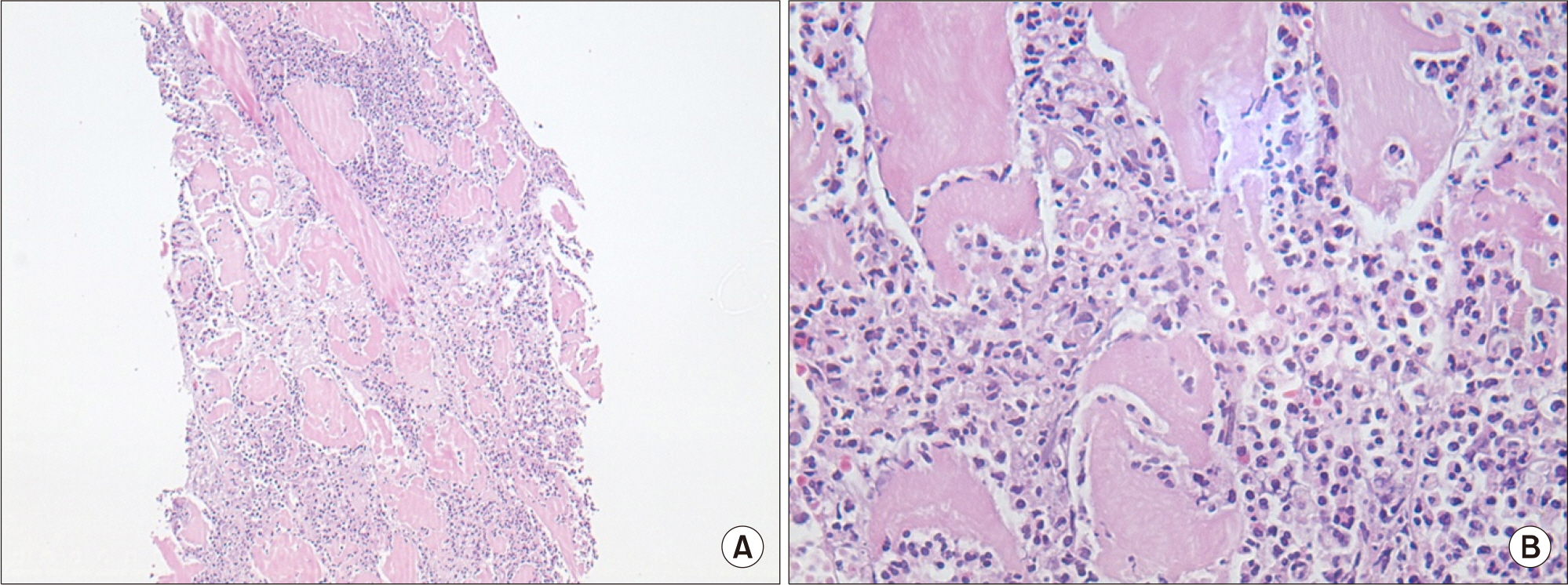J Rheum Dis.
2017 Jun;24(3):161-164. 10.4078/jrd.2017.24.3.161.
A Case of Neutrophilic Myositis
- Affiliations
-
- 1Department of Internal Medicine, Dongguk University Ilsan Hospital, Goyang, Korea. lkh24217@hanmail.net
- 2Department of Pathology, Dongguk University Ilsan Hospital, Goyang, Korea.
- KMID: 2385344
- DOI: http://doi.org/10.4078/jrd.2017.24.3.161
Abstract
- Neutrophilic myositis is a very rare disease histologically characterized by neutrophil infiltration of muscle tissues. We report a case of a 47-year-old man who presented with acute onset of severe swelling and pain on his left shoulder with high fever. He was initially suspected of having cellulitis, but intravenous antibiotics did not improve his symptoms. Similar swelling and pain then developed on both calves. Investigations with magnetic resonance imaging of the lower legs and muscle biopsy led to a diagnosis of neutrophilic myositis. High dose glucocorticoid dramatically improved his symptoms within days. Clinicians need to be aware of this rare disease as a cause of acute febrile myositis mimicking infection.
Keyword
MeSH Terms
Figure
Reference
-
1. Marie I, Levesque H, Joly P, Reumont G, Courville P, Baudrimont M, et al. Neutrophilic myositis as an extracutaneous manifestation of neutrophilic dermatosis. J Am Acad Dermatol. 2001; 44:137–9.2. Kim MK, Park JW, Park SH, Bang SM, Chung JG, Ahn JY, et al. Neutrophilic myositis without cutaneous involvement as the first manifestation of acute myeloid leukemia. Korean J Intern Med. 2005; 20:346–8.
Article3. Christ E, Linka A, Jacky E, Speich R, Marincek B, Schaffner A. Sweet's syndrome involoving the musculoskeletal system during treatment of promyelocytic leukemia with all-trans retinoic acid. Leukemia. 1996; 10:731–4.4. Melinkeri SR, Gupta RK, Dabadghao S. A Sweet-like syndrome manifesting as gingival hyperplasia and myositis without cutaneous involvement. Ann Hematol. 2002; 81:397–8.5. Qureshi JA, Staugaitis SM, Calabrese LH. Neutrophilic myositis: an extraintestinal manifestation of ulcerative colitis. J Clin Rheumatol. 2002; 8:85–8.
Article6. Alawneh K, Ashley C, Carlson JA. Neutrophilic myositis as a manifestation of celiac disease: a case report. Clin Rheumatol. 2008; 27(Suppl 1):S11–3.
Article7. Mosnier E, Rousset P, Hugol D, Bouscary D, Aslangul E. Neutrophilic myositis sine dermatitis in a neutropenic patient with myelodysplastic syndrome. Ann Hematol. 2013; 92:551–2.
Article8. Tymms KE, Webb J. Dermatopolymyositis and other connective tissue diseases: a review of 105 cases. J Rheumatol. 1985; 12:1140–8.9. Ytting H, Vind I, Bang D, Munkholm P. Sweet's syndrome–an extraintestinal manifestation in inflammatory bowel disease. Digestion. 2005; 72:195–200.10. Cohen PR, Kurzrock R. Sweet's syndrome and cancer. Clin Dermatol. 1993; 11:149–57.11. White JM, Mufti GJ, Salisbury JR, du Vivier AW. Cutaneous manifestations of granulocyte colony-stimulating factor. Clin Exp Dermatol. 2006; 31:206–7.
Article12. Cohen PR, Kurzrock R. Sweet's syndrome: a review of current treatment options. Am J Clin Dermatol. 2002; 3:117–31.



